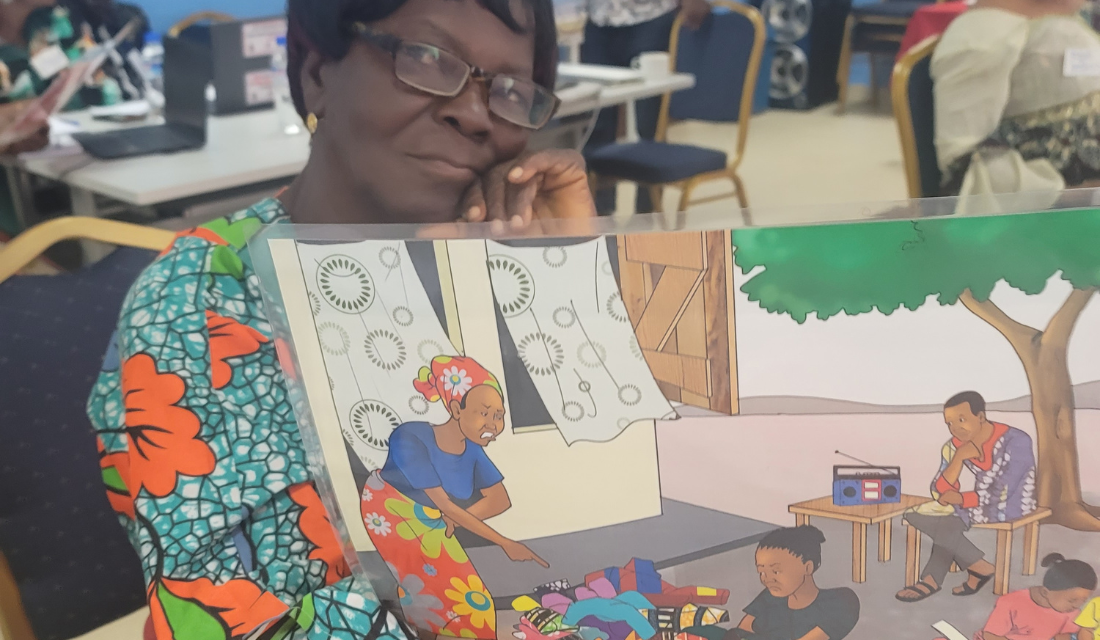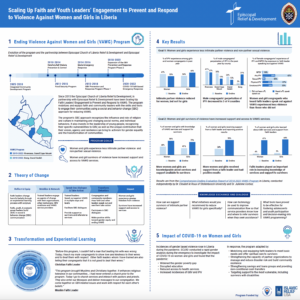How Women Leaders in Liberia Are Helping End Gender-Based Violence for Future Generations

“This program and its resources built my confidence,” said Mother Susanna Lumei, a pastor working to end gender-based violence in her home county of Grand Cape Mount, located in the northwest part of Liberia.
 Mother Susanna traveled three hours to attend an event last year, where some 50 people—Christians and Muslims, old and young, men and women—gathered in Liberia’s capital, Monrovia, to celebrate success, evaluation results and learnings from a recent five-year program called “Scaling Up Faith Leader and Youth Engagement to Strengthen Prevention and Response to Violence Against Women and Girls.” Launched in 2015, the community-led program is implemented by Episcopal Relief & Development in partnership with the Episcopal Church of Liberia Relief and Development (ECLRD).
Mother Susanna traveled three hours to attend an event last year, where some 50 people—Christians and Muslims, old and young, men and women—gathered in Liberia’s capital, Monrovia, to celebrate success, evaluation results and learnings from a recent five-year program called “Scaling Up Faith Leader and Youth Engagement to Strengthen Prevention and Response to Violence Against Women and Girls.” Launched in 2015, the community-led program is implemented by Episcopal Relief & Development in partnership with the Episcopal Church of Liberia Relief and Development (ECLRD).
A featured speaker at the event, Mother Susanna has been a pastor for 24 years, a calling she decided to pursue only after leaving a marriage she describes as “toxic and stressful.” She works in her community and church and serves on her county’s gender-based violence (GBV) Faith Coalition, a group that spurs action throughout the area and coordinates help for survivors of gender-based violence.
She’s a diminutive woman–quiet-spoken with a shy smile–but when speaking about the issues that matter most to her, or sharing her experiences, Mother Susanna becomes animated.
“I used to be hesitant to speak up about violence against women and girls,” she said, recalling how she was told she couldn’t become a church leader because she’s a woman. “I used to feel discouraged and despised, but I gained knowledge through the program,” she explains, “and learned how to stand my ground. Now, I proudly raise my voice to reduce violence in my community and at the same time actively support survivors.”
While a majority of religious leaders in Liberia are men, this program also provided training to 92 women Christian and Muslim leaders and engaged 113 women’s faith groups. Leaders like Mother Susanna are equipped to provide the survivors of gender-based violence with emotional and spiritual support and referrals for health, legal and social services. They also accompany survivors to receive the services they need and can provide access to the program’s temporary shelter and dignity kits containing personal care items for those who’ve had to leave their homes.
During hands-on, experiential workshops facilitated by ECLRD staff, Mother Susanna and other leaders read and discussed Christian and Muslim scriptures that promote respect, dignity and other rights of women and girls. They also explored their understanding of scriptures–such as Ephesians 5:22 – 23 from the Christian Bible–commonly misused to condone violence against women. They learned how to facilitate dialogues using illustrated cards depicting rights violations and forms of violence against women. The faith leaders made a huge impact, leading these dialogues with the cards in their congregations and groups. People reflected, learned and made decisions to change themselves, then planned together how best to take action in their communities to prevent violence.
Mother Susanna was joined at the event by The Honorable Alice Johnson-Howard, Liberia’s Deputy Minister of Gender, whose ministry was actively involved with the program at both county and national levels. “This innovative program demonstrated that faith leaders can serve as powerful champions,” she said, “in transforming communities into a violence-free society that treats women and girls with dignity and respect. Moreover, it’s sustainable because the trained and empowered faith and youth leaders will always be in the communities.”
“They’re motivated. As a leader, I’ve realized I’m a role model and that it’s important to help create spaces for all women and girls to learn, grow and thrive.”
– Mother Susanna
With dynamic women leaders such as Mother Susanna, alongside the program’s trained male and youth leaders, Liberian communities are continuing to expand their work to end gender-based violence so that more women and girls are treated with dignity and respect, live free from violence, and can empower themselves to pursue their goals.
Mother Susanna’s experiences bear that out, too.
“They’re motivated,” she said of the young women in her community. “As a leader, I’ve realized I’m a role model and that it’s important to help create spaces for all women and girls to learn, grow and thrive.”
In her home community of Grand Cape Mount, young girls do see Mother Susanna as a role model. And as change takes hold, these young girls will become role models for future generations.
Learn more about how Episcopal Relief & Development is forging partnerships to reduce gender-based violence and advance equality.
The Scaling Up Faith Leaders Engagement to Prevent and Respond to Violence Against Women and Girls (VAWG) Program in Liberia (2018-2022) was supported by funding from the UN Trust Fund to End Violence Against Women. However, the views expressed, and content included does not imply official endorsement or acceptance by the United Nations. The program was also implemented with the generous support of the Islamic Relief USA. The views expressed herein are those of Episcopal Relief & Development and shall not, in any way whatsoever, be construed to reflect the official opinion of IRUSA, its Islamic Relief affiliates, or its donors.


